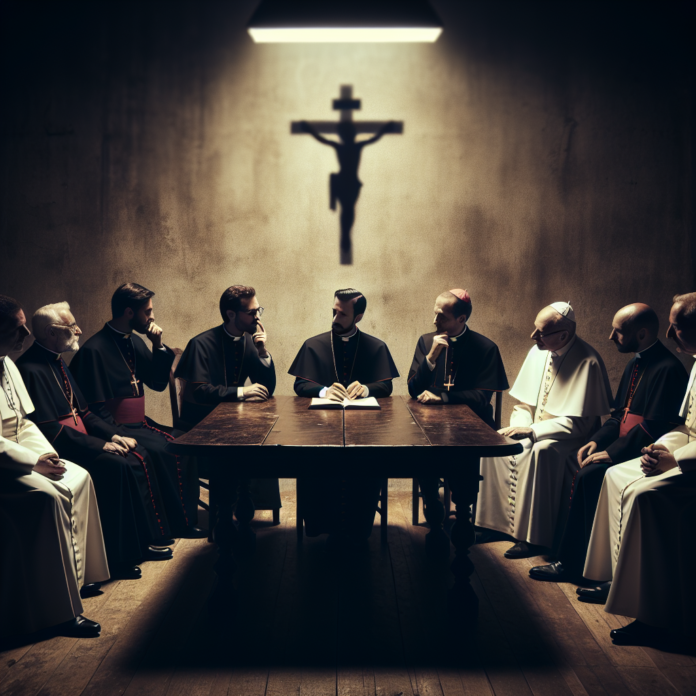For centuries, Catholic priests have played a pivotal role in shaping not just the moral, but also the social and political landscapes of their communities. The Church’s influence extends far beyond the sacred confines of Sunday Mass, imbuing everyday life with its teachings and values. However, the nature of this influence is far from monolithic, with a significant divide existing between traditionalists who cling to conservative values, and progressive elements guided by the visionary leadership of Pope Francis.
The Historical Context
Throughout history, the Catholic Church has embodied both a haven of spiritual solace and a formidable political entity. During medieval times, the Church held tremendous sway over European monarchies, bolstering political decisions with divine endorsement. This intertwining of church and state often stifled dissent and reinforced the power of the ruling classes.
However, the Church has also been a bastion for progressive movements. In Latin America, for example, liberation theology emerged in the 20th century as a powerful force advocating for social justice, a redistribution of wealth, and the rights of the impoverished. Spearheaded by priests who saw Christ in the image of the poor and downtrodden, liberation theology clashed with the traditionalist hierarchy but ultimately carved out a space for itself in the wider religious discourse.
The Role of Priests Today
Fast forward to today’s complex sociopolitical landscape, and you’ll find priests still at the heart of critical community issues. Yet, a dichotomy exists between traditionalists who adhere to strict conservative tenets and progressives emboldened by the transformative messages of Pope Francis.
The Traditionalist Agenda
Traditionalist priests usually focus on maintaining the status quo, often emphasizing doctrines over dialogue. This faction typically finds comfort in rituals like the Latin Mass, which harkens back to what they perceive as a "purer" form of worship. Unfortunately, this perspective can foster a culture resistant to change, alienating those who seek a more inclusive, compassionate interpretation of the Gospel.
Traditionalist communities tend to embrace hierarchical structures, often resulting in the marginalization of voices that do not conform to the set norms. This not only stifles diversity within the Church but also fails to address modern-day issues like climate change, income inequality, and social justice—all of which require proactive, inclusive solutions.
The Progressive Vision of Pope Francis
Enter Pope Francis, a pontiff whose leadership style has invigorated both the faithful and secular observers alike. His forward-thinking perspective challenges the Church to engage with the world rather than withdrawing into itself. Priests aligned with Pope Francis advocate for a church that lives out its mission through active engagement in social issues, drawing on the deepest notions of compassion and solidarity.
Under Pope Francis, the emphasis is on dialogue, inclusivity, and a preferential option for the poor. His encyclicals, like Laudato Si’ and Fratelli Tutti, call for a holistic approach to both environmental stewardship and social justice. This progressive agenda resonates deeply with younger generations and marginalized groups, offering a hopeful vision for a more just and equitable world.
Pope Francis’s push for synodality—a process that involves listening to a wide range of voices within the Church—represents a break from the top-down model of governance. This participatory approach encourages priests to become active listeners in their communities, rather than mere arbiters of tradition.
The Political Landscape
The political implications of these two divergent paths are profound. Traditionalist priests often find themselves aligning with conservative political ideologies that resist progressive social changes. This can lead to an endorsement of policies that neglect social welfare and environmental issues, under the guise of upholding moral values.
Conversely, priests inspired by Pope Francis are more likely to engage in activism that challenges oppressive systems. Whether it’s advocating for immigrant rights, combating racial injustice, or championing LGBTQ+ inclusion, these clergy members are at the forefront of fighting for a Church that is a beacon of hope and transformation.
A Path Forward
The future of the Catholic Church depends largely on which vision takes precedence. Traditionalism offers the comfort of familiarity but risks rendering the Church irrelevant in a world crying out for justice and inclusion. Progressivism, on the other hand, opens the Church up to new possibilities, grounded in the timeless message of love and mercy central to the teachings of Jesus Christ.
In this dynamic interplay, priests must navigate the delicate balance between preserving core doctrines and embracing the transformative, healing power of the Gospel. The choices they make will significantly shape the community’s engagement with broader societal issues.
In conclusion, as we look beyond Sunday, it is clear that the role of priests in Catholic communities is far more than liturgical. They are spiritual guides, community leaders, and political influencers. Whether they choose the path of traditionalism or progressivism will have lasting repercussions, not just for the Church, but for the broader society they help to shape. While the road ahead is fraught with challenges, the vision put forth by Pope Francis offers a hopeful and compelling way forward—one where the Church can fully live out its mission to be a force for good in an ever-changing world.
